 bestof/videogames
bestof/videogames
This is an old attempt to gather the most interesting bits of kirk.is in an easy-to-browse format.
If you like kirk.is mostly for the quotes and links, it might not be the "best of" per se, but overall these pages represent a big part of my creative output so far in the 21st century. The "best of" parts are shown in their natural habitat, often accompanied by the typical quotes and links and asides.
I've divided the work into various categories, and tried to sort each page into roughly descending order of "interestingness". Sometimes there's a particularly chosen closing entry.
 So, Philly Classic 5 was a load of fun! Sold around 30 copies of JoustPong and got to talk to a lot of people about it...the reaction was very positive. Here I am with Howard Scott Warshaw, maker of the 2600 classics Yar's Revenge, Raiders of the Lost Ark, and even the infamous E.T....(he was there to sign copies of his previously unreleased game Saboteur)
So, Philly Classic 5 was a load of fun! Sold around 30 copies of JoustPong and got to talk to a lot of people about it...the reaction was very positive. Here I am with Howard Scott Warshaw, maker of the 2600 classics Yar's Revenge, Raiders of the Lost Ark, and even the infamous E.T....(he was there to sign copies of his previously unreleased game Saboteur)So right now I'm all energized with ideas for projects...but I have a birthday party to get ready for and a house to sell first!
Quote of the Moment
I don't believe in sweeping social change being manifested by one person, unless he has an atomic weapon.I don't know the original context, but it reminds me of a quip I came up that I've been looking for a frame for, "____ -- the cure for incurable optimism". I think "nuclear terrorism" is about as good a substiute for ____ as any...
UPDATE: Aargh. To be taken with a grain of salt, perhaps, Al-Qaeda claims to have briefcase nukes. That combined with them calling for revenge on the USA for the Israeli killing of the Hamas leader is making me antsy. Sometimes I really wonder about what a steely-eyed, completely utilitarian analysis of the cost/benefit ratio of being so closely allied with Israel is. And I also wonder if, besides a sense of justice and attempt to make up for the awfulness of WW2, if wanting to set the stage for the events described in Revelation is behind our historical support for Israel as a standalone entity.
Though you know, some of my concern is focused on "damn, gotta sell the house before things go down"...including the markets.
The first hit on Google for "al qaeda" is a translation of the Al Qaeda Training Manual. Only glanced at it, but it's odd and creepy seeing the "inspirational" language such a thing uses.
Lyrics of the Moment
...to the tune of Paul Simon's Cecilia
Ophelia!I wrote that parody on a past crush's message board back in college. I still think that it's a little clever, and deserves better than to just be buried in my PalmPilot journal. Plus I needed some more post-Philly filler.
You're breakin' my heart
You're makin' this dane
Melancholy--
Oh Ophelia!
It's makin' me sick
like poor old Yorrick
who I knew, who I knew
Makin' love
in the afternoon
it's my uncle
in my mom's bedroom
and Ophelia
has come undone
handing out flowers
to most everyone
Ophelia!
It's changin' my tune
All the slings + arrows
of outrageous fortune
Ophelia
I'm worried a lot
about whether to be...
...or be not
 A while back ClassicGaming.com published my review of the obscure-ish C=64 classics Crossroads and Crossroads II... but somehow I neglected to mention the games author, Steve Harter. Recently I found a different tribute page by a gal named dessgeega... (her site is also the source of yesterday's Starfox 2 link)...in later correspondance she mentioned that Steve Harter had written her about her site. It turns out Steve was amenable to an e-mail conversation with me, and agreed to let me edit into the interview format below. (Anything that doesn't seem to flow, that's due to my faults as an interview editor...)
A while back ClassicGaming.com published my review of the obscure-ish C=64 classics Crossroads and Crossroads II... but somehow I neglected to mention the games author, Steve Harter. Recently I found a different tribute page by a gal named dessgeega... (her site is also the source of yesterday's Starfox 2 link)...in later correspondance she mentioned that Steve Harter had written her about her site. It turns out Steve was amenable to an e-mail conversation with me, and agreed to let me edit into the interview format below. (Anything that doesn't seem to flow, that's due to my faults as an interview editor...)
How old were you when you wrote Crossroads? Did you do anything else for the C=64, or any other of those systems?
I was 17 at the time when I developed CR1. I also did a couple more "magazine" games unrelated to Crossroads for the C64. They basically helped my pay for college (in computer science of course).
 Really?? How well did those magazines pay?
Really?? How well did those magazines pay?
I said "helped pay" ;) For CR2 it was like $5,000 including upfront and royalties but back in the 80s that went a long way...
I kick myself though for not trying to make Crossroads a bit better and getting a cartridge publisher -- I assume the royalties would have been much better.
Could be! Though I never thought of the C=64 as being much of a cartridge machine. And, in retrospect, I think Crossroads was retro even then or maybe... arcade-y, relative to that era's trend of longer games with bigger and more involved worlds.
I wonder if I worked on the cartridge version if I would have tried to do a big world too... something with a story line or an arena playoff theme perhaps with a real ending (not just a game over) --
 How well was the game received?
How well was the game received?
I got a few fan letters forwarded from Compute -- for one kid I gave him a workaround so he could have more than 9 shields because he was upset that the other characters could have more than 9 (he was right).
As a gamer, I'm mostly interested in multiplayer games through the ages, and Crossroads has a fantastic Co-op or Compete factor. Plus I've noticed that most any game that does a good job of throwing a swarm of enemies at you tends to catch my attention. I've always said that Crossroads was special for making you feel like just one more monster type among other monsters....
I really enjoy playing games with other (human) players -- all of the four games I created for the C64 were two-player simultaneous that basically limited the game to an overhead view (before split screen became feasible)
 I've always admired how skillfully Crossroads uses the C=64's character graphics, especially with having characters move in half-character steps, other character-based games weren't so fine-grained...
Did your ideas about the possibilities of
character-based graphics drive the design of the game, or vice-versa?
I've always admired how skillfully Crossroads uses the C=64's character graphics, especially with having characters move in half-character steps, other character-based games weren't so fine-grained...
Did your ideas about the possibilities of
character-based graphics drive the design of the game, or vice-versa?
The idea of a lot of characters moving around the screen with AI interested me such as Robotron and Wizard of Wor. But making a Robotron-style game perform for the c64 would have been impossible due to all of the pixel blits and collision detection needed since there could only be 8 sprites. So I started tinkering with a Wizard of Wor style game that could use characters instead of pixel blits or sprites and thus thought of using one- and two-character transition animation.
Did you come up with all the monsters and names on your own?
I created all everything in the game on my own (characters, sounds, etc) but Compute named the characters and did the magazine artwork.
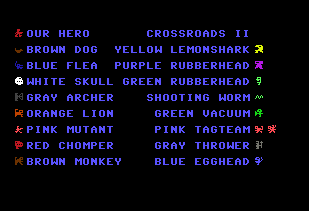
Do you recall how the monster allies/enemies rules worked? Were some especially bitter rivals? How did the AI work in general?
Well the yellow, red and blue were friends, light tan guy and horse thing were friends, two grey soldiers were friends, I think the rest were enemies. Nothing in the AI for being more bitter over one enemy vs. another
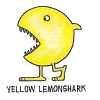 The core AI aspects of CR are based on how far he can see, if he runs or
chases other enemies and who the friends are. I wish I could have done
more here, such as worms that would take up more than one character
block.
I also wish I would have made one change to the game: for an "eating"
character I wish I would have given him an extra shield every time he
took one from someone. It would have completely changed the game.
The core AI aspects of CR are based on how far he can see, if he runs or
chases other enemies and who the friends are. I wish I could have done
more here, such as worms that would take up more than one character
block.
I also wish I would have made one change to the game: for an "eating"
character I wish I would have given him an extra shield every time he
took one from someone. It would have completely changed the game.
That snake I idea sounds awesome... but those eating lemonsharks were tough already!
How did you manage to keep the players moving at a constant speed, even as the monsters were slogged down?
For the constant speed of the two players and their bullets, I basically set a "heartbeat" variable in the interrupt loop (every 1\60th sec) that the main (infinite) loop checked after every non-player character was displayed. The player's bullets move at full speed so if you look at the player's bullets every 1\60th of a second they move one half of a character. There is also an algorithm used to speed up the other characters over time based upon another heartbeat variable.
Oh, so the speedup isn't just a byproduct of a fully loaded processor? I was thinking about Lore Sjoeberg's Book of Ratings quote about Space Invaders:
As you killed off the low-res interplanetary menace, the remaining would-be conquerors, fueled by revenge and freed-up CPU cycles, would steadily increase in speed, until one last Invader would be zipping across your screen like a Yorkie on crystal meth.I always thought that applied to CR as well...
 It does increase in speed if characters are killed too fast, but eventually will slow down if you don't keep killing more of them too fast. I don't remember the algorithm off the top of my head, but it adjusts a tiny bit faster\slower every few seconds to try to find the best fit for the current level and how long you have been playing the current level. The first level starts out painfully slow for the little players, and I think by level 16 or so it is running at full speed even with a few enemies.
It does increase in speed if characters are killed too fast, but eventually will slow down if you don't keep killing more of them too fast. I don't remember the algorithm off the top of my head, but it adjusts a tiny bit faster\slower every few seconds to try to find the best fit for the current level and how long you have been playing the current level. The first level starts out painfully slow for the little players, and I think by level 16 or so it is running at full speed even with a few enemies.
Such attention to detail!
What about those cool explosions? Are those sprites, or direct pixel drawing, or what?
The explosions\implosions are sprites. I now wish I wouldn't have displayed the score at the end though -- too korny. To save magazine space, the sprites are randomly created during bootstrapping so are different every time you run the game. I think there are four sets of explosions generated so they also vary for a single game session too.
 Did that mean there were only 8 explosions possible at once?
Did that mean there were only 8 explosions possible at once?
Yes, they just cycle through
Did you do line of site for monsters? I was thinking that limited vision, besides being more realistic, also would mean less computation.
Yes I think the blue fleas could only see like 4-5 spaces which definitely cut down on the computation
I remember trying to pick up assembly programming on the C=64 but it totally kicked my pre-adolescent butt... I finally manged to make my own game for the Atari 2600 in ASM, and even though it's known to be a tough platform, in some ways the stripped-down environment might be easier to get a handle on...
I would dread coding the 2600, I agree that it would be harder IMO to write a playable game on the 2600 than the C64. The C64's support for customizable character set, SID, sprites, smooth scrolling and memory size just made it an awesome game machine at the time. I learned ASM because BASIC was just too slow for anything. Two books I couldn't have lived without were "mapping the 64" and a 6510 assembly language reference (I still have these). I actually used Compute's crappy free LADS assembler because I was too poor to buy one (thus the reason why I got into cheap paper magazine games).
Other tidbits about the game:
 1) In CR2 the dog at level 20 becoming stronger and aggressive
1) In CR2 the dog at level 20 becoming stronger and aggressive2) I put my initials in one of the mazes in CR2, as did Randy T. did for the sample maze in the Maze Editor he wrote for CR2
3) There is also a rare bug that causes a hidden wall to be added, but I didn't try too hard to fix that since I thought it was an interesting effect
4) CR1 doesn't have my name in the game because Compute blanked it out before publishing. The CR2 version I sent Compute did not have my name scroll by, but if someone typed in the program from the magazine or if the game detected the loader for those who bought the disk then my name was shown. The check for the typed-in program worked because Compute always put 0's in the last few fill bytes of the last line of program but they were normally 255's in memory. So I basically got my name there without them knowing about it.
That's really clever, I love it! About that loyal dog... would it ever turn on you if you shot it? (Or am I just thinking of Nethack?)
No it doesn't turn on you... It would have been funny though. It's been a while since I've gotten to level 20+ though...
What do you think of the Crossroads fansites, and the interest in retro gaming in general?
Just a couple years ago I installed a C64 emulator with the CR2 ROM and got teary eyed (it was probably 10 years prior to that the last time I fired up my C64 and played it). I also got teary eyed the first time I got MAME working and played some old classics. So I definitely understand this retro gaming thing. Today I enjoy playing CR2 via emulator with my 7-year old son -- it's funny but he can beat me at Mario Kart but doesn't have a chance against me in CR2.
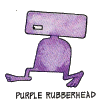 Have you seen XRoads, a port of the game to X-Windows?
Have you seen XRoads, a port of the game to X-Windows?
I never tried try the XRoads port but would like to. I gotta get started on the port to a modern console ;-) I think it would be cool though to create the retro port plus a newer, online version of the game where each character could be a real person.
Well, thanks very much for your time and insightful answers!
Thank you, it's been fun talking about this
Dessgeega's tribute page has a video of the gameplay, and my classicgaming.com review has the downloads...it's worth checking out, this game didn't receive nearly enough attention.

A long while back on the Usenet group rec.games.video.classic I asked if River Raid "ends", and how...in response Erik Mooney posted a hack of River Raid where the plane won't die and you can just let it run...I ran it overnight and came back to a game that was still running, but with a kind of messed up world. So ever since then, I've thought about trying to assemble big "Nintendo Power"-style combined stitched-together "maps" so that we can see exactly when things start to go awry...
Expect more of this project later, I hope to give an even more complete map a permanent home, in collaboration with B. Watson.
I've been finding some new (to me) videogame links I liked lately... Here's a detailed tribute page to an obscure favorite of mine, Time Pilot '84. The game had a great sci-fi style, along with a "Raid on Bungeling Bay"-esque feeling as if life in the evil empire was going on off-screen, throwing tons of enemy fighters, and bosses at the player, who had a nifty homing missle feature to defend himself...the best defense being a good offense, and all that.
|
|
It's funny, I only saw the game at this little funky ice cream parlor in Cleveland Heights (you could bring in anything and they'd turn it into icecream so long as you promised to buy a certain amount of it) and when I see that page, I get a bit of sensory impression of that old place, even though I was only there a few times.
 |
| mario kart, multiplayer fun |
Classic Games are interesting to me in the way they had to create microcosms from scratch; thus, there was some more flexibility in the worlds they gave the player to interact with, along with fewer expectations about how good things needed to look (one programmer could do all the code, the sound effects, and the art). Some of this has been lost as games have grown in complexity, but I think your view of modern video games is very limited. You mistake some of the dominant trends for the whole thing. Yes, 90% of modern games are derivative crap, but that's been true through many eras of gaming. Do you know how many Space Invaders and Pac Man clones there were? No, because they've properly fallen into the historical dustbin, of interest only to fans of the history of the field. (Actually, it's probably more like 95% of games are derivative, and half of those are crap, and the other half provides decent experiences for fans of the genre.)
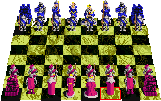 |
| battle chess |
As for the "In fact, to this day no one has made a movie as funny as the silent comedies," I don't know if I agree. I think the audience reactions you describe have as much to do with audiences of the era than with the content itself. I haven't watched many silent films, but it has been my experience that some of the comedies from the period right after in a similar physical style (Marx Brothers, Three Stooges) aren't laugh out loud funny for modern viewers.
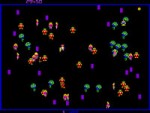 |
| robotron: too much for 3D? |
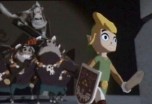 |
| the new zelda, aka 'celda' |
You might think that Miyamato is the exception that proves the rule...after all, he's an old-schooler himself, having made games starting with Donkey Kong and moving into the future...but many game houses are experimenting with looks and styles other than "as realistic as possible." There's an interesting trend using "Cel Shading" that provides some very interesting new looks. Still 3D, but more animation-inspired. And even old school game style and variety is making a comeback in "party games" such as "Mario Party" or "Fuzion Frenzy," that bundle many small and unique classic style games in a single graphical and gaming context.
So in short, while I somewhat agree with some of your opinions about industry trends, I don't think you've looked deeply enough at the trends you disparage, or to see what else is going with video games.
--Kirk Israel
 He argues that playing to win every time is the best path, and that people who don't are "scrubs" who don't know what they're missing and who will be forever limited by their own choices. He presents some compelling arguments, and is worth the read, but I had a few objections I'd like to bounce off of people here:
He argues that playing to win every time is the best path, and that people who don't are "scrubs" who don't know what they're missing and who will be forever limited by their own choices. He presents some compelling arguments, and is worth the read, but I had a few objections I'd like to bounce off of people here:
 First off, Play to Win exhibits great faith in game designers, that in "99.9%" of the situations, there isn't a simple strategy that wins over all others, or that the community will serve to eliminate those games that do fall to a simple pattern. So therefore, any arbitrary restrictions by "scrubs" are largely pointless and out of the true spirit of gaming. But Sirlin himself points out some exceptions to this, cases where the "Pros" agree it is justified. Essay 1 talks about Akuma:
First off, Play to Win exhibits great faith in game designers, that in "99.9%" of the situations, there isn't a simple strategy that wins over all others, or that the community will serve to eliminate those games that do fall to a simple pattern. So therefore, any arbitrary restrictions by "scrubs" are largely pointless and out of the true spirit of gaming. But Sirlin himself points out some exceptions to this, cases where the "Pros" agree it is justified. Essay 1 talks about Akuma:
But the first version of Street Fighter to ever have a secret character was Super Turbo Street Fighter with its untouchably good Akuma. Most characters in that game cannot beat Akuma. I don't mean it's a tough match--I mean they cannot ever, ever, ever, ever win.[...] the community as a whole has unanimously decided to make the rule: "don't play Akuma in serious matches."Also from the mailbag
Roll canceling is a bug requiring difficult timing that allows a player to have many invulnerable moves that the game designers never intended. [...]Should roll canceling be banned? I'm pretty sure it meets the standard of "warranted" since I'm satisfied that under serious tournament conditions, the game completely fell apart into a jokeSo, there at least some cases where restrictions are acceptable... therefore, the question is just one of degree.
Then, in describing his own feats he talks about his moves of doing a defensive move until his opponent finally does something stupid:
For example, an opponent faced with my "jumping straight up and down Zangief" could simply decide to back off and wait. What he might not realize is that I have unlimited patience. Since my brick wall in this case is keeping me even (I'm not falling behind) I'm happy to do it forever, which is probably much longer than he's willing to avoid the battle. Most opponents lack the will to avoid battle forever, and will eventually enter into it at a disadvantage out of impatience.I assume the game would time out if both players took this kind of tactic, and it would end in a tie (correct me if I'm wrong) So Sirlin is relying on the other player having slightly more devotion to the game not being utterly pointless, while all he will ever care about is winning.
He makes a bigger philosophical defense of the pursuit of the truly optimal strategies
Imagine a majestic mountain nirvana of gaming. At its peak are fulfillment, "fun", and even transcendence. Most people could care less about this mountain peak, because they have other life issues that are more important to them, and other peaks to pursue. There are few, though, who are not at this peak, but who would be very happy there.I think his assumption of it being the "happiest" peak is unfounded (in fact, elsewhere he argues that amateur chess players have more fun than the pros) but at least he also points out the possibilities of other peaks. (Also, there's an interesting dependency, then, on being surrounded by similar caliber players, and possibly even doing research out of the game, like online...)
 He puts forward some thought-provoking ideas, and I've even put his book on my Amazon wishlist but if taken too seriously, he can be almost Nietchian or Ayn-Randian in outlook. It's a short hop from him applying this kind of gamesmanship to the show "Survivor" to thinking about how the ideas might be applied to real life. And that leads to some profound questions, what's really worth pursuing in life? and how do you tell if you succeed?
He puts forward some thought-provoking ideas, and I've even put his book on my Amazon wishlist but if taken too seriously, he can be almost Nietchian or Ayn-Randian in outlook. It's a short hop from him applying this kind of gamesmanship to the show "Survivor" to thinking about how the ideas might be applied to real life. And that leads to some profound questions, what's really worth pursuing in life? and how do you tell if you succeed?
(In practice of course, some of this all comes down to me being total crap at the type of fighter games he's so good at. In fact, a lot of what he describes requires an ability to emulate and even visually observe that I'm not sure that I have. The first mountain for the newbie player to climb is recognizing what the opponent is doing and how, and that's actually pretty tough in and of itself.)